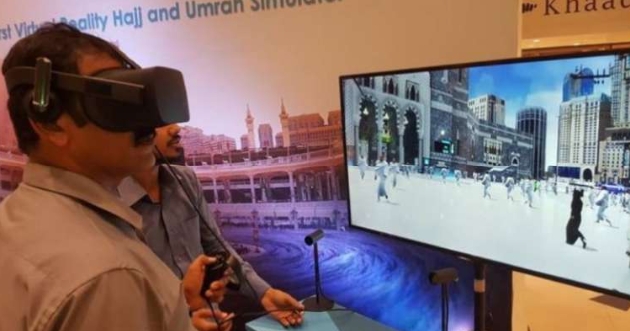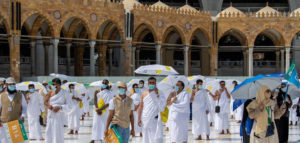Article Source: Ihram.co id
Hajj metaverse has become a conversation among netizens on social media. It comes after the Saudi Arabian government announced a virtual reality (VR) initiative that allows Muslims to touch the Black Stone without leaving their homes.
The technology is called the “Virtual Black Stone Initiative” which is a new VR technology and brings Muslim holy sites to Muslim living rooms during the Covid-19 pandemic. Unfortunately, this step is opposed by many people because it is considered that performing worship through metaverse technology is illegal.
What exactly is the Metaverse?
Also Read: Be Careful of the Trap of Deploying Peacekeeping Forces to Gaza
As quoted by USA Today on Wednesday, Metaverse is a combination of several elements of technology including VR, Augmented Reality (AR), and video where users can interact in a digital world. Metaverse users can work, play, and stay connected from concerts and conferences to virtual trips around the world.
Imam of the Grand Mosque Sheikh Abdul Rahman Al-Sudais was the first to try the technology. Last December, he wore VR glasses at an inauguration event.
“Saudi Arabia has huge religious and historical sites that must be digitized and communicated to everyone through new technological means,” Sudais said last December, quoted by the Middle East Eye.
However, the initiative has been subject to much debate. For example, the Turkish Presidency of Religious Affairs or Diyanet says Muslims can visit the Kaaba in the Metaverse but that this activity does not count as worship.
Also Read: The Forty-Four-Days of Glory: Azerbaijan’s Struggle for Justice and Peace
“The Hajj has to be done by going to the holy city in real life. The Metaverse version of the Kaaba became controversial among Muslims around the world after Saudi Arabia’s ‘Virtual Black Stone Initiative’ event in December,” said Director of the Department of Hajj and Umrah Services Diyanet Remzi Bircan.
What is the attitude of the Indonesian Ulema Council?
Meanwhile, the Indonesian Ulema Council (MUI) gave a view on the Metaverse pilgrimage. Asrorun Niam Sholeh, Head of the MUI Fatwa Division, said that the virtual Kaaba visit platform via Metaverse could be useful for identifying locations that will be used as places of worship.
“However, regarding the implementation of the pilgrimage by visiting the Kaaba virtually it is not enough because it does not meet the requirements for the pilgrimage,” said Asrorun as quoted from Republika.co.id on Wednesday.
Also Read: Palestine Solidarity Month: A Collective Movement for Al-Aqsa and Palestine’s Freedom
Asrorun explained the pilgrimage is a mahdlah worship and is tauqify which means that the procedure for its implementation has been determined. There are some rituals that require physical presence.
“Hajj is a religious worship and is dogmatic in nature, the procedure for its implementation is based on what has been exemplified by the Prophet Muhammad,” he said.
In addition, the implementation of Hajj rituals is related to visits in several places. For example, the Tawaf which is performed around the Ka’bah seven times is started from the corner of the Black Stone physically with the Ka’bah in the left position.
“The Hajj and Umrah rituals cannot be carried out in the heart, wishful thinking, or virtually. Including being carried out by circling a picture of the Kaaba, or a replica of the Kaaba. Virtual visits can be made to introduce and prepare for worship or commonly called ritual exercises Hajj or Umrah,” he added. (T/RE1)
Also Read: Hassan al-Turabi: A Controversial Thinker from Sudan
Mi’raj News Agency (MINA)




































 Mina Indonesia
Mina Indonesia Mina Arabic
Mina Arabic